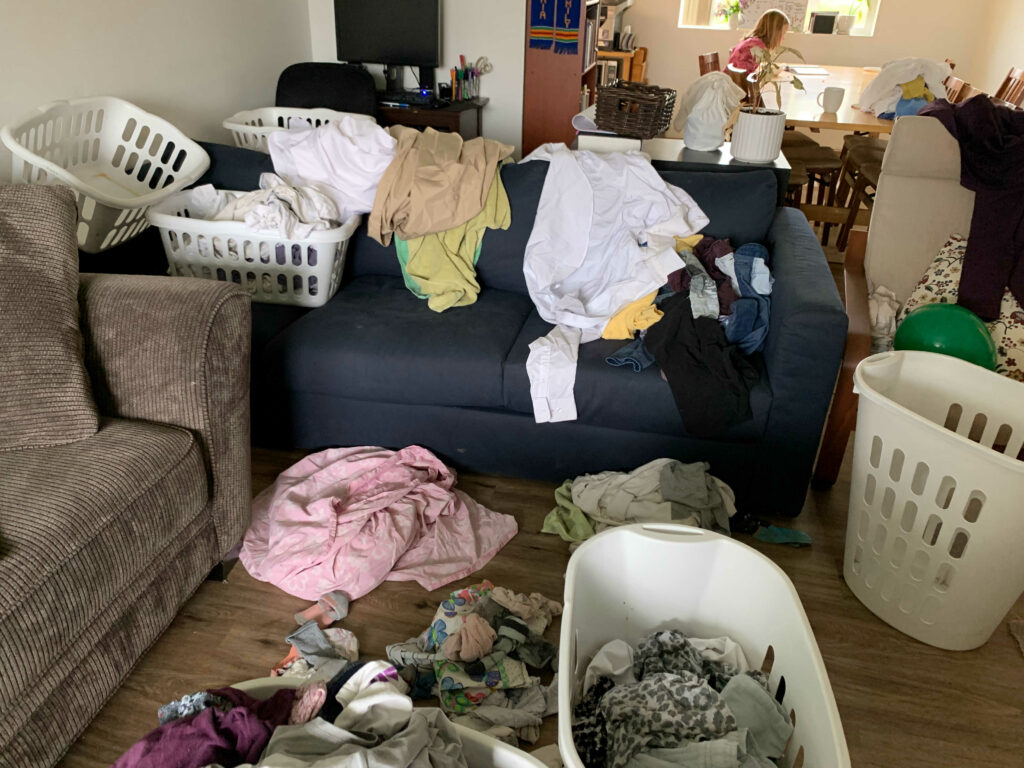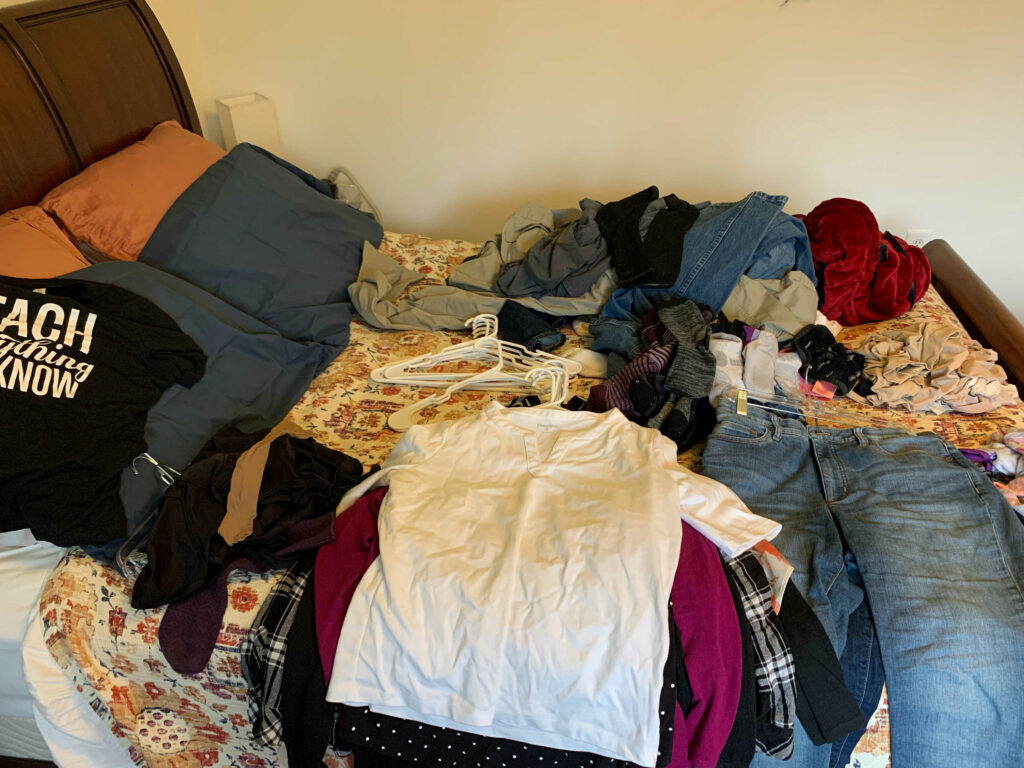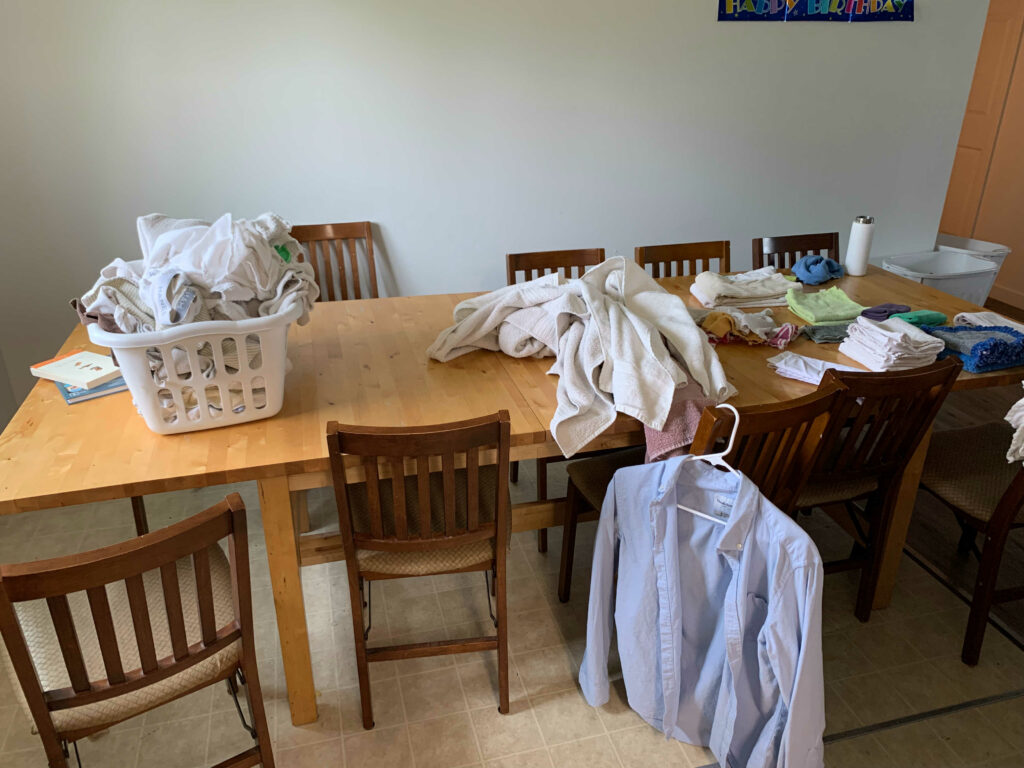
How can I enjoy laundry, the never-ending chore?
Instead of chasing the perfect laundry routine, embrace flexibility and purpose. Laundry is about caring for people, not just finishing a task.
True confession: I’ve tried every configuration of laundry routine out there and never found one that made me stay on top of laundry.
I can discover a good rhythm, but then something will change.
It turns out that laundry is not evenly produced over time, so if by a “consistent” laundry routine we mean one where we do the same thing all the time and get the same results, it’s just never going to work.
In winter, the clothes are bulkier, so fewer fit in the washing machine. In summer, swimsuits and towels need quick rinses and a dry cycle.
Little kids have little clothes, but they get them dirty at a fast and furious rate. Still, the dirt frequency and level isn’t regular. The amount of laundry varies with activities, weather, and health (or lack thereof).

Big kids have big clothes. Big kids should learn to do some laundry. Big kids have their own ideas about how they’re going to spend their time and it doesn’t fit with my desire to have the load out of the laundry room.
People get sick. Illness becomes a compound problem because it generates more laundry and takes the laundress or her minions (or both) out of commission. Extra laundry is heaped up on a laundry backlog.
Life gets busy. The rhythm, for a day or two or even a week, becomes untenable. Routines are dropped for the sake of a family emergency, extra hospitality, or big life events. Sometimes routines are suspended simply because the needs of everyday life have added up and require all our attention and time. So the laundry is forgotten. And forgotten laundry quickly becomes Mt. Washmore, looming before us in overwhelming heaps.

However, none of these are reasons to lament laundry or to pronounce oneself a laundry failure.
It’s simply the reason why a “consistent” laundry routine – meaning, doing the same thing day after day – will ever get us a consistent, on-top-of-it result.
Not only will the laundry never be finished (it’s not supposed to be), but it also fluctuates dramatically.
Our job as homemakers is not to figure out the automation that generates equal results, day after day and week after week.
Our job is to live responsively, dancing the dance of home life.
When homemaking is judged by the standards of industry, business, finance, it appears to be drudge work – the work outsourced to those on the lowest rung of the pay scale. Homemaking looks like janitorial service, merely clean up after other people plus child care. It’s the grunt work done to facilitate the real productive people who do things of value.

I’ve read many, many books on business, time management, and productivity. A common theme is outsourcing anything outside your own gifting, specialty, or “zone of genius.” You know what always makes it onto the “delegate” list? Housework. Laundry.
It’s not worthy of someone who could be using their time creatively, they all assume.
We ought to wonder what they think of people to whom these chores are delegated. Are they those for whom laundry is a “zone of genius”?
In one negative comment online comment I once received about teaching kids to do chores around the home, some revealed their disdain for routine housework by saying it is “something anyone could learn how to do in a few minutes.”
We can easily operate under these assumptions without ever really recognizing that we are. An undervaluing of the maintenance work of home and family life is systemic in our culture. We imbibe the attitude unconsciously. Even if we’d deny it with our minds and mouths, we slip into the mentality in our self-evaluations and emotional responses.
We assume housework will take no skill, no talent, no learning curve. So when the learning curve is steep and our skill is low, we don’t know how to respond. We think we’re either missing some magic piece to make it all fall into place or that we’re just bad at it.
Housework, however, even laundry – especially family laundry management – does take skill. It does take practice. It takes management potential exercised to its limit.
Our assumption that it’s easy is simply false. Operating under false assumptions always feels like banging your head against the wall. That’s the wall of reality. We don’t change reality. We won’t with it.

Yes, laundry is repetitive. Laundry is a maintenance job. Laundry is a service. Laundry is variable and unruly and never-ending.
That’s why it takes skill and creativity. It takes a homemaker willing to throw herself into her calling to even begin to pull the threads of life together in a home. Those who cut out their home life with take-out, laundromats, and daycare have not increased their productivity and certainly not their satisfaction and fulfillment.
Laundry, with all its ups and downs and overflows, reflects rhythms of real life. As we learn to adapt, expanding and contracting our time with laundry as needed, we are learning how to handle a people-oriented rather than project-oriented life.
Projects can be manipulated and managed with efficiency and outcomes in mind. Projects are meant to be completed. Laundry is not a project.
Laundry reflects the movements and activities and quantities of people. Laundry requires us to be responsive and flexible. Processes and supplies and laundry room layouts can help or hinder the work, for sure, but the sheer amount, repetition, and variety of laundry means no process will ever totally tame it into a project with a check-off-able outcome if certain tasks are done “consistently.”
Sometimes we think we need to be more consistent when we really need to be more aware and responsive. Consistency assumes that doing the exact same thing in the exact same time increments will yield the exact same result. That’s simply not the case in the home.
Especially when we are given to hospitality – to our families and also beyond our families – the work will ebb and flow. There are more dishes after having people over for dinner. The same amount of time and energy put into the dishes every day will not yield the same results.
It’s the same with laundry. Sports seasons, muddy seasons, snow seasons, school seasons, wedding seasons – all these change up what is needed in the laundry room.
There is no one routine that will last for years to come or even from one season to the next.
So the first step to accepting the work of laundry cheerfully is recognizing when we start thinking our job is to “check off” laundry as if it were a project. Our goal isn’t empty hampers and machines. Our goal is keeping up and keeping on.
Doing a good job at home does not mean no work is ever left undone. That way madness lies. Doing a good job at home means being attentive and responsive, providing for the needs of people. People need food and clothes, but they also need love and conversation and time.
As wives and mothers we’re providing for the needs of our people and of any people that may enter our home. The time given to any one task will fluctuate due to which need is most pressing in the moment.
When we shift our laundry focus off of the task and process itself and recognize that laundry is one of the many ways we are caring for people, we can find more satisfaction and joy in the work even as it piles up and never ends.
Our laundry lament can be turned to laughter when we look at it as a liturgy of loving care.



